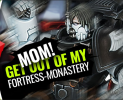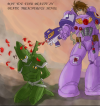David Johansen
Legendary Pubber
- Joined
- May 4, 2017
- Messages
- 5,986
- Reaction score
- 12,187
Inspired by a thread elsewhere that asked what the potential D&D killers are and have been. MERP, Traveller, WFRP, Vampire, Star Wars IMO with all having various reasons why they didn't kill D&D.
But this thread isn't about that as much as how they should have or could have gone about it.
My big one is Games Workshop, which as a company certainly has the resources and the capacity but lacks the will or the interest.
I think I'd argue that Games Workshop was in a really good position to kill D&D for about 20 years and never did. The reason was that they didn't see rpgs as profitable enough and ditched that part of their business. Even Dark Heresy didn't do well enough to keep in house from GW's perspective. But in terms of a longstanding gaming company with popular IP, they really could have taken the top spot if they wanted to.
The obstacles I see are that WFRP is a bit too fiddly, the typical edition and supplement churn issues of the rpg industry, and the material is not very family friendly. Not that its full of awfulness but it's visuals will scare Karen. Something more like Advanced Heroquest (not Warhammer Quest) that plugged more directly into the wargame and was simpler in play would probably have been a better fit. Put in modular character sprues, use single sprues from army sets for monsters to make a killer starter box. Probably do 40K instead of fantasy. Alternately they could just pick up the Lord of the Rings rpg license.
In any case, if they were really smart, they'd make the book under $20 and have booster packs around $10. So the core line is a fully playable book. A series of booster packs and adventures with maybe one sprue of monsters and a map or a character figure and some cards with powers and equipment on them. There's a price point issue but one of the major advantages of Magic the Gathering is cheap starters and boosters. It might work to make the boosters random. They'd have to be boxes to prevent parcel pinching then but you could avoid the issue with assortments where there's a popular item and an item you get stuck with in every box. One thing to bear in mind is that GW's packaging costs them more than the contents so foil baggies or something might be the way to go.
One interesting thing about GW is that their Black Library fiction has been profitable enough to keep going but rpgs weren't which mirrors 90s TSR.
But this thread isn't about that as much as how they should have or could have gone about it.
My big one is Games Workshop, which as a company certainly has the resources and the capacity but lacks the will or the interest.
I think I'd argue that Games Workshop was in a really good position to kill D&D for about 20 years and never did. The reason was that they didn't see rpgs as profitable enough and ditched that part of their business. Even Dark Heresy didn't do well enough to keep in house from GW's perspective. But in terms of a longstanding gaming company with popular IP, they really could have taken the top spot if they wanted to.
The obstacles I see are that WFRP is a bit too fiddly, the typical edition and supplement churn issues of the rpg industry, and the material is not very family friendly. Not that its full of awfulness but it's visuals will scare Karen. Something more like Advanced Heroquest (not Warhammer Quest) that plugged more directly into the wargame and was simpler in play would probably have been a better fit. Put in modular character sprues, use single sprues from army sets for monsters to make a killer starter box. Probably do 40K instead of fantasy. Alternately they could just pick up the Lord of the Rings rpg license.
In any case, if they were really smart, they'd make the book under $20 and have booster packs around $10. So the core line is a fully playable book. A series of booster packs and adventures with maybe one sprue of monsters and a map or a character figure and some cards with powers and equipment on them. There's a price point issue but one of the major advantages of Magic the Gathering is cheap starters and boosters. It might work to make the boosters random. They'd have to be boxes to prevent parcel pinching then but you could avoid the issue with assortments where there's a popular item and an item you get stuck with in every box. One thing to bear in mind is that GW's packaging costs them more than the contents so foil baggies or something might be the way to go.
One interesting thing about GW is that their Black Library fiction has been profitable enough to keep going but rpgs weren't which mirrors 90s TSR.







